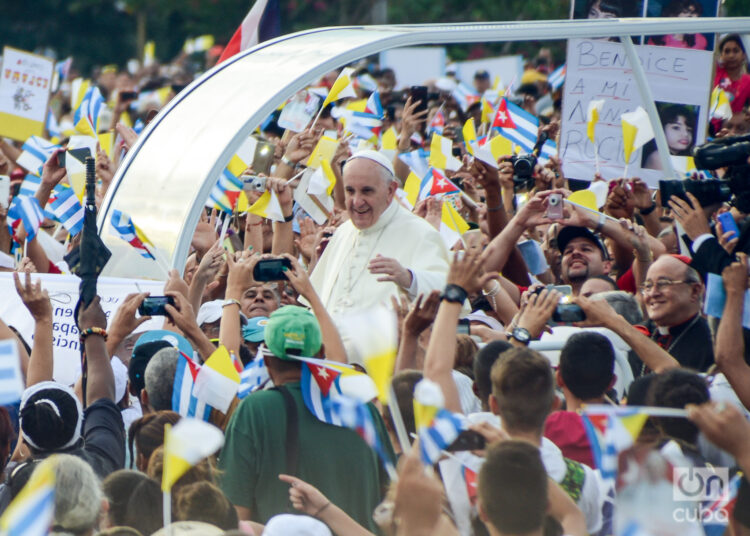I was still processing the death of Pope Francis when Father Yosvany Carvajal Sureda (Havana, 1975) agreed to speak by telephone with OnCuba. Although it was predictable in the game of probabilities, the news was no less shocking and felt like a catastrophe for a world increasingly beset by misfortune.
His 38 days in the Gemelli Hospital, from which he was released on March 23, kept millions, faithful and non-faithful, on tenterhooks day and night. Then came his unexpectedly busy Vatican agenda. Just one day before his death, with a faint voice and a weary look, the Pope spoke to the faithful from St. Peter’s Basilica and offered a final Urbi et Orbi blessing. Holy Thursday found him in Rome’s main and oldest prison, Regina Coeli.
For our interlocutor, of all the popes, Francis has been the most beloved to contemporary Cubans, both as a pastor and as a statesman.
Ordained a priest at the age of 24 by Cardinal Jaime Ortega, who soon asked him to become pastor of the Cathedral of San Cristóbal de La Habana, live in the Archbishopric, and become secretary of the institution, Carvajal Sureda is the President of the Cardinal Jaime Ortega Foundation and Rector of the Father Félix Varela Cultural Center, one of the think tanks of Catholicism on the island and a facilitator of analysis and debate on decisive issues of national life.
He studied Philosophy at the Pontifical University of Mexico, and then Bachelor’s and Licentiate degrees in Theology at the Pontifical Gregorian University in Rome.
He is a professor of Philosophy and Theology at the San Carlos y San Ambrosio Seminary in Havana, and at the Father Félix Varela Institute of Ecclesiastical Studies, which he founded.
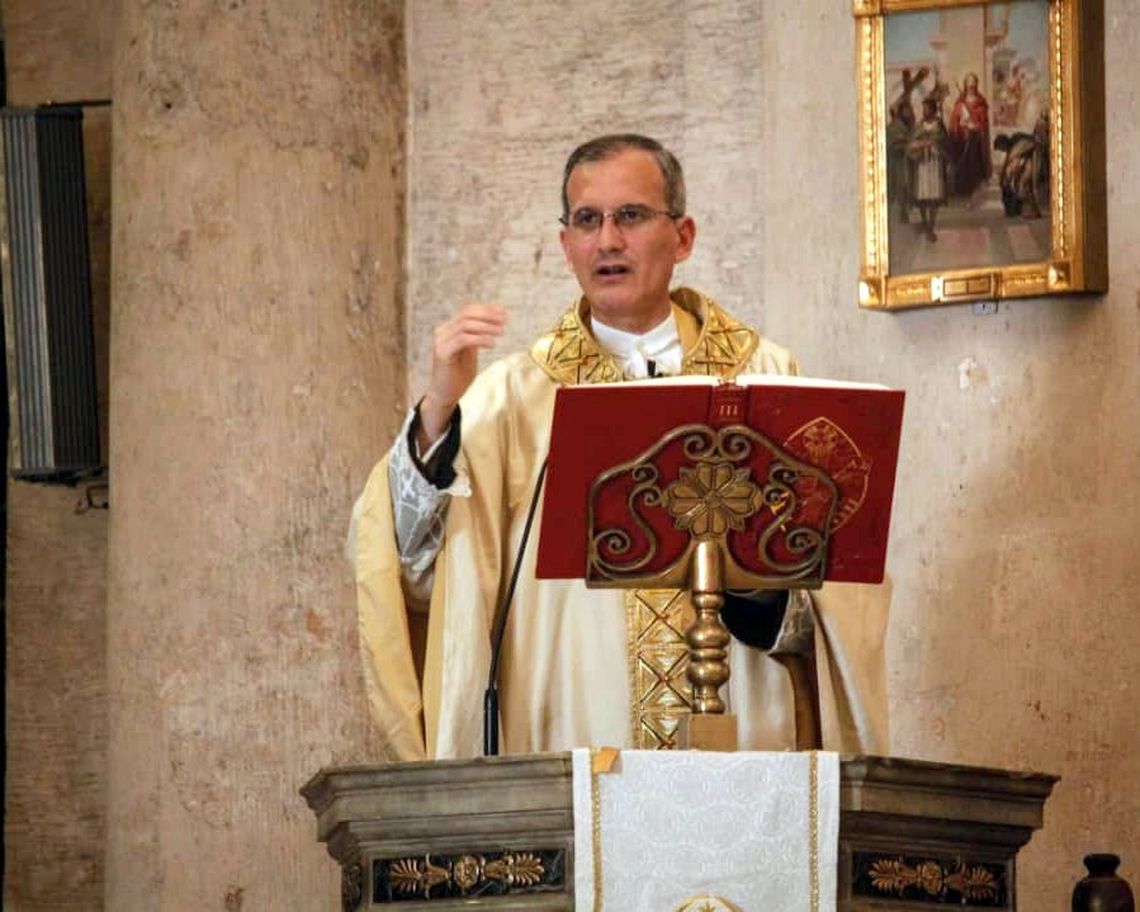
A symbolic date
How have you experienced the news of the Holy Father’s death? Did you expect him to go beyond this health crisis?
The Pope’s health had been deteriorating for some time. We saw him walking with a cane, breathing with some difficulty, until a series of illnesses began to appear that degenerated into an acute respiratory crisis with pneumonia, from which he managed to recover.
I thought he would recover for a while longer, that his departure wasn’t so imminent. But he surprised us, and it was no less than on the Octave of Easter, that is, right on the day of the most important Christian feast, the resurrection of the Lord.
Do you perceive a symbol in this coincidence?
Yes, I believe there can be no better date than this to depart from this world to the Father’s house. Easter is the meaning of the Christian life.
Life with God, the ultimate destiny and final goal of human existence, Christ’s triumph over death, over evil, is what we Christians celebrate at Easter. The Pope died during the Easter celebrations, the most important celebrations of the Christian faith.
A redeemer
If I were to ask you for a quick portrait of Francis, where would you place the most prominent features?
Well, he was a man who marked the history of the Church, and I would say more: the history of humanity. Much should be said about Pope Francis, about his teachings, about his ethical and moral teachings, which relate not only to the personal life of a Christian in his relationship with God, but also to his social relationships, his relationship with the environment.
He was the pope who wrote an encyclical on Creation, on environmental care, Laudato Sii, a letter that set a unique guideline in the history of the papacy. I would dare say that Francis is the pope of mercy and hope, because just as John Paul II was the man of dialogue, of the relationship between faith and reason, and Benedict XVI greatly helped interpret the mysteries of faith because he was a scholar of the Church, Francis was the man of concrete gestures of fraternity, even as a political category, I would dare say.
He knew how to use something inherent to the Gospel of Jesus Christ, which is fraternity, to extend it to all spheres, not only the religious, but also the social and political; also in his dialogue with the Muslim world, with politicians, in his interpretation of the social relations of human beings.
He marked an important stage in the history of the Church as the pope of the fraternal gesture of encounter, of concern for the common good, of learning to forgive one another. That is why I describe him as the pope who spoke most about God’s mercy, which must then be reflected in mercy for one another.
I would dare to define him in this general way. I know that many more things could be said about his pontificate, but this is what I retain as the most valuable of his entire Petrine ministry.
Imprint in Cuba: against the tenements
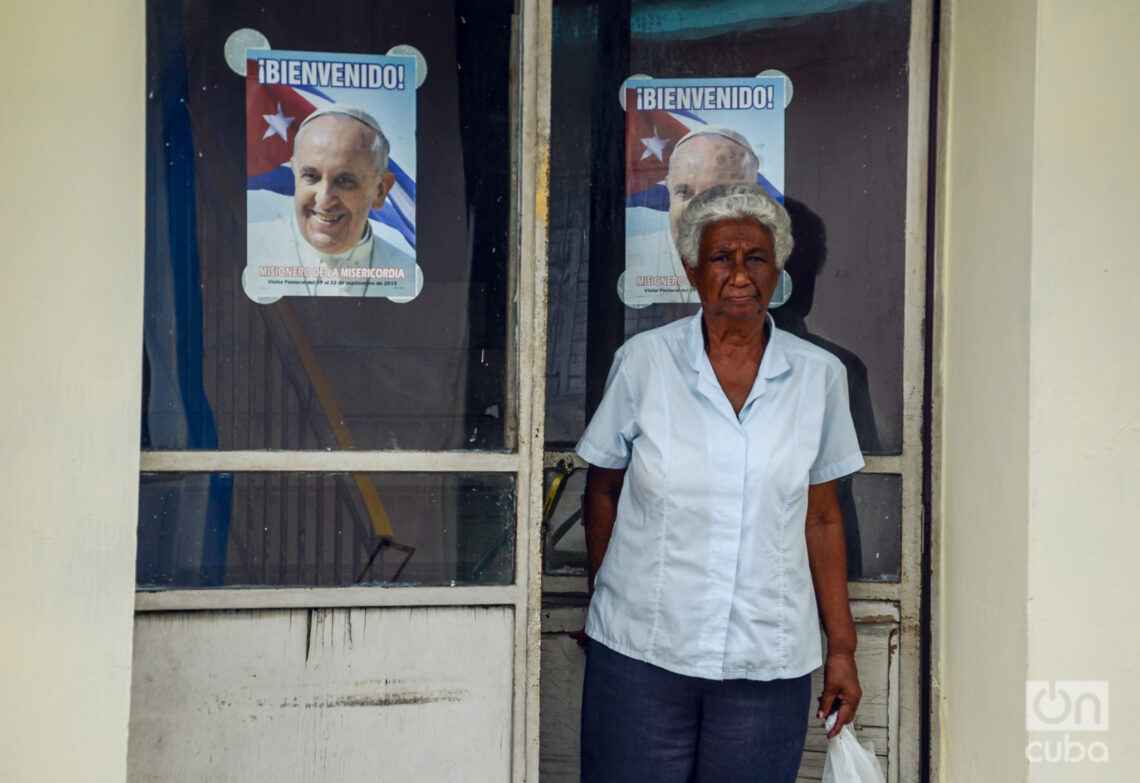
Bergoglio visited Cuba a couple of times, making the island the only country in the world with that privilege. Although you alluded to it in some way in the previous answer, what is the pastoral imprint that the Holy Father leaves among the parishioners and clergy of this country?
When he came to Cuba, the Pope taught us the art of dialogue and forgiveness. He spoke for the first time here, at the Father Félix Varela Cultural Center, to a large group of young people of all political and ideological tendencies and preferences — Catholic and non-Catholic young people, of course — and invited them to dream, to never tire of doing so.
Then he used another very important concept: the culture of encounter. Faced with a throwaway culture, as he called it, in today’s world, where the one who counts is the one who produces, the one who has, the one who consumes, the one who possesses material goods or shows them off, Francis opted for the culture of encounter, where two people who think differently can meet and forge a goal together.
He believed that we Cubans would always choose dialogue. He encouraged not only the young people present at the cultural center, but also the civil authorities. He invited us all to dialogue, because for Pope Francis, dialogue was the only way to achieve higher goals, so that we all work toward the common good, so that no one is excluded because of different ways of thinking. He even used a term that the young man who presented the speech at that moment had used, and it was the word “tenements.”
To not lock yourself inside the tenements, which can be religious, ideological, or political. These tenements make us think that only what we know in our own personal world or in our belief system exists. The Pope invited everyone to transcend them, to not lock ourselves in them and open ourselves to others in order to achieve higher goals.
I think that was the most forceful teaching of his visit to Cuba in 2015.
Francis, high politics, and the thaw between Havana and Washington
We know that Father Francis directly influenced the thaw between Cuba and the United States, which unfortunately later failed, and that this process was assisted by a diligent Cardinal Ortega. Recently, the Vatican was involved in the release of 500 prisoners, a significant number of them political prisoners, a gesture to celebrate the jubilee year that the authorities ultimately honored. How do you assess this accompaniment of Francis in Cuba’s political dynamics?
Popes — not just Francis — have always accompanied Cuba. We must remember that when John Paul II came to the island, Christmas was declared a holiday, and he said that historic phrase in the Plaza de la Revolución: may Cuba open itself to the world, and may the world open itself to Cuba with all its potential. There is a papal teaching there. Then Benedict came as a missionary of charity, and then Francis came as a missionary of hope and mercy.
All the efforts of the Holy See and the popes over these years have served to truly realize John Paul II’s desire for Cuba to open up to the world. And how is that achieved? Well, always through dialogue, agreements, and everything that helps achieve that goal.
I believe Francis continued the entire teaching. There was no break with the teaching of John Paul II or Benedict XVI. In other words, there is continuity in the papal teaching toward Cuba from these last three popes who have visited us.
And these have been very positive actions to benefit people in need, prisoners of conscience or otherwise, or political prisoners. Furthermore, through his actions, when he came to Cuba, Pope Francis left a positive message to the political authorities about the work of the Church, about what it can do for the common good, and he advised that it not be limited to the cultural, to the merely liturgical.
The Church should not be confined to the sacristies of churches. Religion and faith have a social function, one of fraternity, of reconciliation, which is the very essence of the Gospel of Jesus Christ.
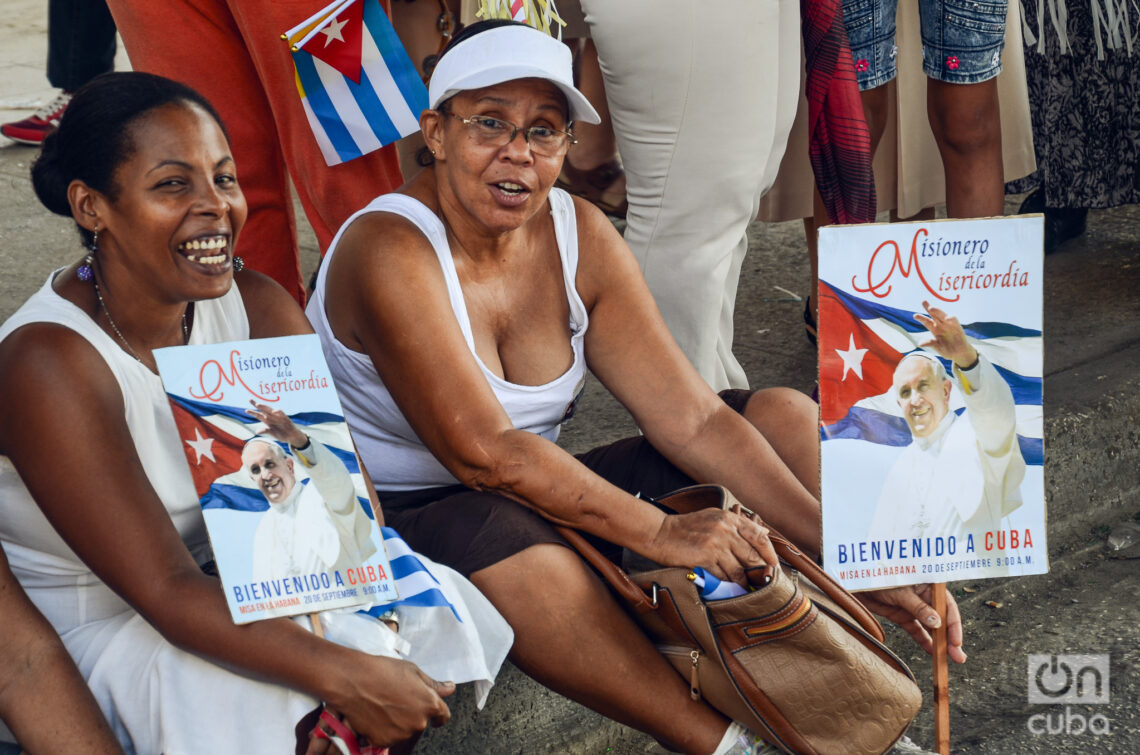
The legacy: Will there be a break in continuity?
There is a consensus about the great spirit of renewal, reform, and, of course, justice that Francis displayed during his papacy, and, as you said, it is unprecedented in contemporary history, except if we look back to John XXIII, who was another milestone for the Church in his social doctrine and vocation of service. Now, what is the most important legacy that the 12 years of Francis’s pontificate, as a world statesman, leave us?
Francis bequeathed us lessons that are sorely needed in every era: not to be locked inside our small worlds, which may be ideological or religious, and that we must always care for the poorest. This pope was a defender of the poor, of the voiceless, of migrants, of those who suffer great hardships to survive, and he was a defender of the family, of marriage, of family love, of tenderness.
Another very beautiful definition of Pope Francis’s pontificate is “the revolution of tenderness,” because he used that term in this way and on several occasions, so that all human beings may learn not to fear affection, tenderness, and to express it, because that is what makes us truly human and therefore similar to God.
I emphasize the capacity to love. And that transcends what can reduce human beings to ideologies, to all that confines them, limits them, and makes them incapable of dialogue, of opening up to others. In his teaching, the Pope speaks to us of love and tenderness, saying that this is the language that dignifies us all and makes us equal; it makes us brothers and sisters, regardless of tendencies, positions, ways of thinking, and so on.
Father, I don’t know if you’re familiar with the latest book by the Spanish writer Javier Cercas, who accompanied Francis on his trip to Mongolia in 2023 at the invitation of the Vatican. It’s a very recent text and difficult to label. It’s titled God’s Fool at the End of the World, and in promotional interviews the author has given, he said, perhaps anticipating the unfortunate event, that it would be very difficult for the Pope’s legacy to be overshadowed, distorted, hijacked, or simply dismantled by the powerful conservative forces inside and outside the Vatican. Do you think Francis’s legacy, in its most radical and challenging content, will survive his death?
I believe so, because those who think based on tendencies, personal tastes, and ideological options greatly reduce the essence of a pontificate. These are always human calculations, I think, and they lose sight of what is proper to faith and what is proper to the pontificate of a pope, in this case, Francis. In other words, the Pope did not want to be confined to any concept.
He was a defender of the dignity of the human person and the value of the faith that dignifies it. And he never wanted to be confined to any ideological or political concept. Many have confined him to those concepts because of his way of speaking, because he was from Latin America. After all, he was part of the theology of the people, typical of Central and South America. But he never allowed himself to be confined to any kind of political or ideological tendency within the Church. Instead, he was always the man who looked up to Christ, to faith as an absolute value.
The Church has a teaching, a social doctrine, and the Pope was one of its best exponents. We must study, we must read, we must search.
People who don’t read or don’t search, or are unaware of the teachings of the Church’s social doctrine, perhaps out of ignorance, criticize the Holy Father; but if they are well acquainted with what the Church has taught in its social doctrine throughout the centuries, in its social ethics, I am convinced they will understand Francis’s thinking much more closely.
Therefore, I believe that the value of faith will prevail over other tendencies that tend to reduce the Pope’s thinking to ideology, and then his legacy will prevail. There are some who say that truth is a child of time, and they are right in that phrase; we will see, in time, whether Pope Francis and his teachings were relevant or not.
Perhaps the world was not ready to accept his ideas, and he anticipated that future that we will rediscover. That is why I have hope that his teachings, the value of his magisterium, will not disappear, but will continue in the history and thought of the Catholic Church.
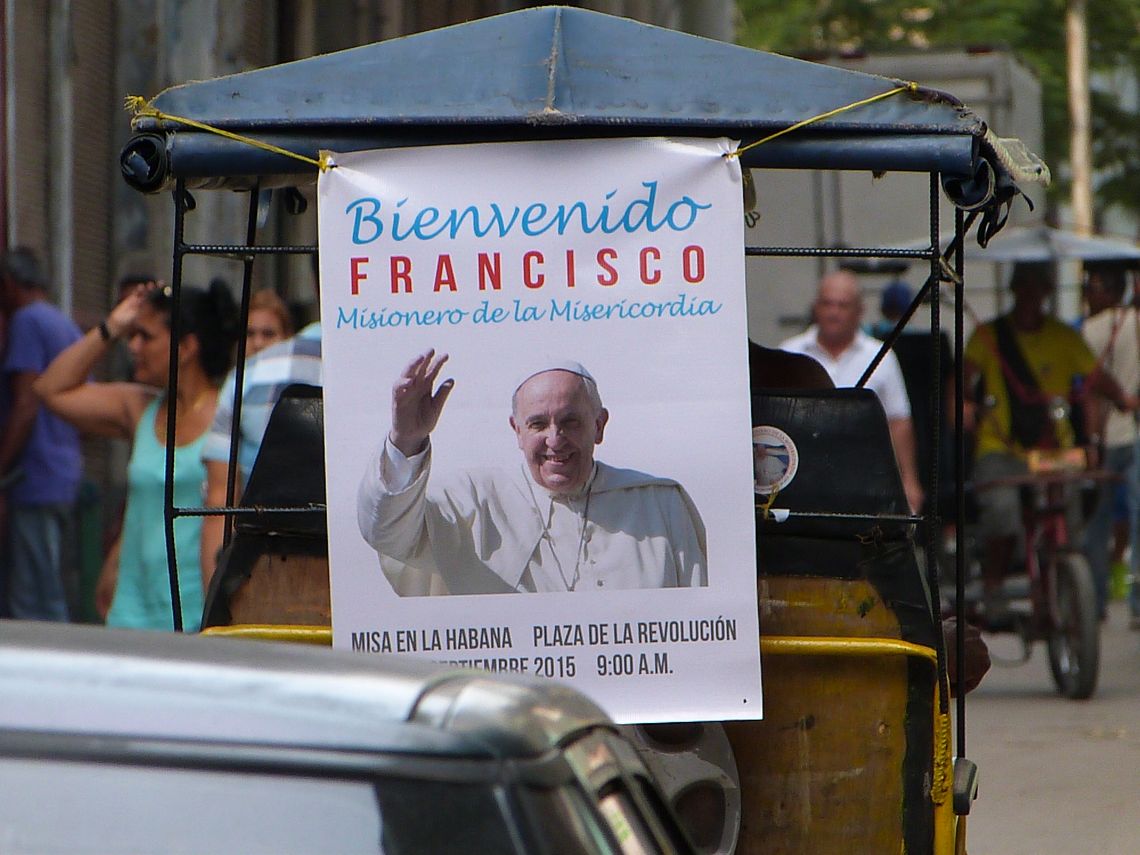
Preparing the Church for a change of era
You have mentioned ethics and the need to defend the Church’s social doctrine, which Francis always sought to promote by confronting pedophilia, the opacity of finances, the concealment of the truth, the lack of justice in the face of abuses of power, indifference, pomp, and tolerance of sin. And, on the other hand, Francis fought to modernize the ancient institution, promoting the presence of women within the Curia and proposing a different perspective on homosexuality based on moral humility; vital issues for a Church that has suffered and continues to suffer dissent and emigration of parishioners to other faiths. Many are wondering what will happen to this strategic effort by Francis. Will it be taken up by the next papacy, at least in its decisive priorities?
I think Francis had to embrace not only a critical moment in the history of the Church, but of the world. He told us: “The world is facing a profound crisis,” not just the Church. In fact, the Pope insisted many times that we are not facing an era of change, but rather a change of era.
What he did with his pontificate was place the Church in that change of era. That is, what will be the role of the Church in this context? How will we make the Gospel credible in the face of a change of epoch, a change of mentality in the West? What will be the role of Christians? The Church must act with transparency; it cannot fall into earthliness. In fact, a key phrase of his pontificate was to avoid spiritual earthliness; that is, avoiding the human person of faith, whether cleric or not, associating himself with the mentality of the world and distancing himself from the solid criteria of the Gospel.
This is what Pope Francis always referred to, which is why he put the finances in order and called the lack of transparency earthly, when people don’t know the purpose of their aid to the poor and the needy; also with the issue of pedophilia in the Church; that there be transparency in the procedure and that the victim be saved; that is, that the person who has been a victim of abuse be heard, etc.
I believe that we cannot give up after this pontificate. Not ever. In other words, we cannot go back; Francis has already opened a door to how the Church should face all circumstances in a time that is completely changing.
I dare say more: everything he did to purify the evils that accumulate over the years, with stagnation, with habits, prepared us to go out into the world without fear. He even said that a Christian, a cleric, must get his hands dirty in the world, but by doing good, never participating in evil or allowing himself to be dragged down by earthliness, but rather getting his hands dirty in the sense of showing solidarity with the poor, with just causes, with the common good, with service to the neediest, with those without a voice or a vote.
In that sense, Pope Francis prepared the Church for that future, for that scenario in which it constitutes a small flock but, I dare say, significant, as Benedict XVI said.
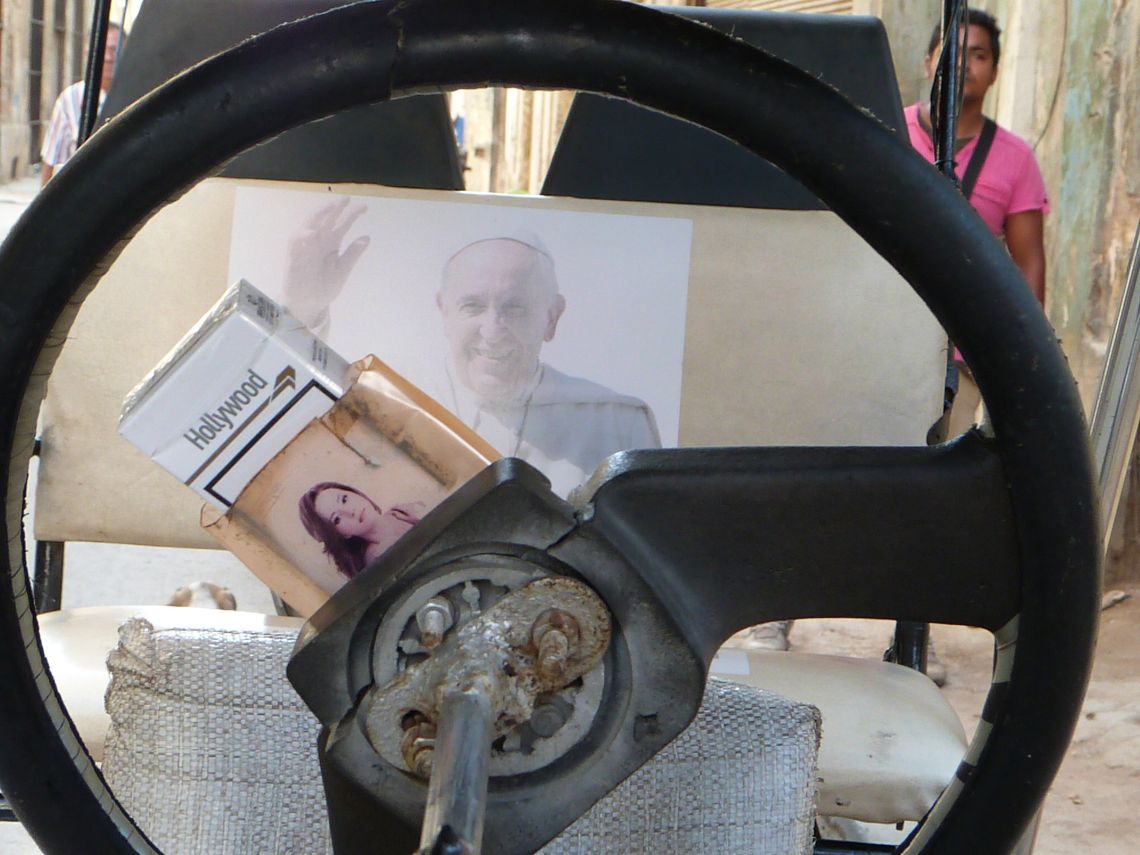
A Franciscan petitioner
Bergoglio was a truly empathetic and sympathetic man, both to laypeople and believers, atheists, and I don’t know if to the powerful as well…. The fact is, he always asked for one thing: that people pray for him, and he said it in a tone tinged with ambiguity, somewhere between grace and drama. So, you, who like Francis are a priest, in this case the parish priest of Havana Cathedral, will you ask your faithful to pray for Francis’s soul?
Yes, he always asked for that since he stepped out onto the balcony of St. Peter’s when he was elected pope in 2013. That was the first gesture, a very eloquent gesture, which he asked for with his head bowed, as a sign of humility, in that square packed with faithful. And he did so in each of his speeches, his addresses: “Do not forget to pray for me,” because a pope, a priest, a bishop, anyone who holds any role of authority in the Church or of service, is, above all, a child of God and in need of God and of their brothers and sisters. No one is saved alone. Francis showed us this sense of the need for others with great humility.
I believe we have learned to pray for Francis, I dare say, even the most atheistic. In Havana, he also used the phrase “Pray for me” and added: “…and if you don’t know how to pray or don’t believe in God, at least wish me good things.” I will remember that beautiful phrase of his.
Praying is a theological, religious term, but for those who don’t live in that world, Francis also knew how to use a word to be understood. He made himself understood by believers and nonbelievers alike, and that atheistic world also understood him when he asked them to “wish me good things.”
I believe that today all people of good faith, believers or not, wish Pope Francis well, his eternal rest, and that his legacy, his teachings, and all the good he did may never be lost, and that he may always remain in the hearts of all of us who were able to experience his pontificate.

